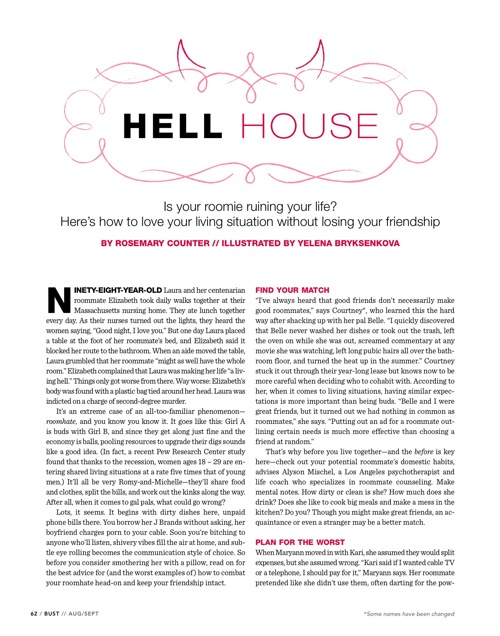Hell House
Is your roomie ruining your life? Here’s how to love your living situation without losing your friendship
Ninety-eight-year-old Laura and her centenarian roommate Elizabeth took daily walks together at their Massachusetts nursing home. They ate lunch together every day. As their nurses turned out the lights, they heard the women saying, “Good night, I love you.” But one day Laura placed a table at the foot of her roommate’s bed, and Elizabeth said it blocked her route to the bathroom. When an aide moved the table, Laura grumbled that her roommate “might as well have the whole room.” Elizabeth complained that Laura was making her life “a living hell.” Things only got worse from there. Way worse: Elizabeth’s body was found with a plastic bag tied around her head. Laura was indicted on a charge of second-degree murder.
It’s an extreme case of an all-too-familiar phenomenon—roomhate, and you know you know it. It goes like this: Girl A is buds with Girl B, and since they get along just fine and the economy is balls, pooling resources to upgrade their digs sounds like a good idea. (In fact, a recent Pew Research Center study found that thanks to the recession, women ages 18 – 29 are entering shared living situations at a rate five times that of young men.) It’ll all be very Romy-and-Michelle—they’ll share food and clothes, split the bills, and work out the kinks along the way. After all, when it comes to gal pals, what could go wrong?
Lots, it seems. It begins with dirty dishes here, unpaid phone bills there. You borrow her J Brands without asking, her boyfriend charges porn to your cable. Soon you’re bitching to anyone who’ll listen, shivery vibes fill the air at home, and subtle eye rolling becomes the communication style of choice. So before you consider smothering her with a pillow, read on for the best advice for (and the worst examples of ) how to combat your roomhate head-on and keep your friendship intact.
Find Your Match
“I’ve always heard that good friends don’t necessarily make good roommates,” says Courtney*, who learned this the hard way after shacking up with her pal Belle. “I quickly discovered that Belle never washed her dishes or took out the trash, left the oven on while she was out, screamed commentary at any movie she was watching, left long pubic hairs all over the bathroom floor, and turned the heat up in the summer.” Courtney stuck it out through their year-long lease but knows now to be more careful when deciding who to cohabit with. According to her, when it comes to living situations, having similar expectations is more important than being buds. “Belle and I were great friends, but it turned out we had nothing in common as roommates,” she says. “Putting out an ad for a roommate outlining certain needs is much more effective than choosing a friend at random.”
That’s why before you live together—and the before is key here—check out your potential roommate’s domestic habits, advises Alyson Mischel, a Los Angeles psychotherapist and life coach who specializes in roommate counseling. Make mental notes. How dirty or clean is she? How much does she drink? Does she like to cook big meals and make a mess in the kitchen? Do you? Though you might make great friends, an acquaintance or even a stranger may be a better match.
Plan for the Worst
When Maryann moved in with Kari, she assumed they would split expenses, but she assumed wrong. “Kari said if I wanted cable TV or a telephone, I should pay for it,” Maryann says. Her roommate pretended like she didn’t use them, often darting for the power button and hiding as Maryann walked through the door.
Ngaio can relate. She and Andrea were casual friends all through high school, so when Andrea landed at Ngaio’s university, they decided to save some money by sharing a lease. Their first clash was on move-in day. “She just assumed she’d be getting the good room,” says Ngaio. They’d quickly fallen for a brand-new oversize space but hadn’t thought to discuss whose bedroom was whose. “Typically I don’t care about that sort of thing, but she made a big deal about it, so I said it was fine.” It was not fine and the dispute had the pair off to a rocky start.
According to Mischel, house expenses, room assignments, and stuff-sharing are exactly the kind of things that should be discussed prior to move-in day. And she suggests going one step further. “I’m a proponent of making an actual business plan,” she says. “Just like an attorney in a contract makes plans for any variable or possibility, when you enter into a lease with a roommate, you need to do the same thing. Like a prenup.” Smart roommates should abandon their delusions and get nitty-gritty with the details, creating an agreement that covers bills (who will pay what), cleaning (what chores need to be done and who will do them when), sharing (what’s off-limits and what you’ll buy together), and even how rooms and closets are to be divided (flip a coin? the one with the bigger room pays more rent?) before signing a lease.
The “Other” Roommate
When Chelsea moved in with a friend from work, she thought she’d won the roommate lottery: Heather was considerate, neat, and hardly ever there. But six months into their lease, Heather asked if her new boyfriend could crash with them for a week or so while he found a new place. “A month and a half into this situation, I was pissed,” says Chelsea. Heather had quit her job to spend more time with her boyfriend, and the two rarely left the house. “They ate all my food, never cleaned, made a bunch of calls on my cell phone using up all my minutes, and were there all the time hanging out and watching TV.”
“The biggest complaint is always the ‘third roommate,’” says Mischel, and you need to speak up the moment this threesome isn’t working for you. “You say, ‘I understand you have a significant other but I need to be comfortable in my own home,’” Mischel suggests. Then make your requests reasonable and clear: mandatory shirts, a per-week limit on sleepovers, contributing to the grocery fund. You might be surprised how a regular $50 donation to the fridge makes you much more lax with your milk.
Or, if you’re the one with the significant other, you need to respect your roomie’s wishes and find an acceptable compromise. “I lived with a woman who was very socially conservative, especially about sex and men,” says Megan, a NY-based editor. “She had an overwrought fear that every man was little more than a potential rapist—even my shy, quiet then-boyfriend—and she couldn’t sleep well with one in the house. So we talked it out: he would sleep over no more than two days a week, and he wouldn’t have keys.”
Sex and Privacy—You Need Both
Dealing with one another’s sexcapades in such small quarters is always a challenge. “I respect everyone’s right to a sex life,” says Samantha, who still shudders to think of the year she shared a room in her college dorm. “What I did not respect, however, was my roommate’s logic that deemed it perfectly acceptable to bring a guy back to our room in the middle of the afternoon, whilst I was typing away at my desk with my back turned, and proceed to give her lucky friend a good ol’-fashioned BJ.” Same awkward story for Alexandra, who was lucky enough to have a wall between her and her drunken roommate’s loud, late-night booty call on the very first night in their new apartment. “I could hear her saying, ‘My roommate’s home, shut up, shut the fuck up!’” Alexandra recalls, cringing. So she cranked the volume on her iPod—a godsend, she says—wishing she were the one who wouldn’t remember it in the morning.
So how do two girls living under the same roof still manage to get their rocks off? In addition to making use of earplugs and loud music like Samantha and Alexandra recommend, you can also invest in a white-noise machine, says Mischel. But probably most important is some perspective: when your roomie’s moanings have you seething, try to remember that with any luck, the tables will turn, and if you’ve dealt maturely with her kinks, she’s much more likely to return the favor.
Communication Breakdown
Regardless of how much planning you’ve done, you can count on times when things will get sticky. And you’ll probably have a hard time saying anything about your roommate’s transgressions. “You really want to get along,” says University of Michigan psychologist Jennifer Crocker. “Since there’s a sense you can’t raise issues, you start doing things to convey you’re pissed without being direct.”
Leilani lived with two friends, and all three were working and pursing various artistic endeavors. That meant odd hours, deadlines, and conflicting schedules—so forget about the chore wheel. Instead, they decided that each of them would be responsible for one room of the apartment: the bathroom, kitchen, and living room. It all worked fine until a “pretty wicked mold growth” in the bathroom had Leilani in an allergic huff. The bathroom wasn’t her responsibility.
Rather than cleaning it herself or mentioning it politely, Leilani chose silent resentment and an eventual passive-aggressive email attack, which her roommate didn’t respond to kindly. “She said if it bothered me so much, why didn’t I just deal with it? And why did she always get the grossest jobs?” Then for the first time in weeks, her roommate cleaned the bathroom, from top to bottom, at 1 a.m. (Just guess whether she was stewing in rage the whole time.) The mold was gone, but so was their harmonious roommate relationship.
At some point, angry midnight disinfections can start to feel normal. As can neurotic food labeling. After three months of roommatehood, Emilie, an otherwise-sane 27-year-old, found herself diligently writing her name in Sharpie on every single one of her eggs. “It would have been more appropriate to say, ‘I see you’ve been eating my eggs; maybe let’s share,’” she says. But amidst an advanced battle of roomhate, logic just won’t do. “I was already so nonsensically pissed off that I thought I just really didn’t want anyone eating my fucking eggs,” she says.
“If there’s an issue, it’s far better to speak up about it, because the longer it goes unaddressed, the worse it’s going to get,” says Samantha, who wishes she’d had a conversation with her roommate immediately after the notorious afternoon-BJ situation. Because once you’re annoyed, each and every minor offense becomes an opportunity for subtle aggression, which women tend to opt for over confrontation. So if you’re a routine egg borrower, consider your actions and your roommate’s reactions as deliberate moves of passive aggression that can pile up fast. Before you know it, you’re both saying the I’m-not-really-fine “fine” when it’s blatantly obvious that the opposite is true. If the pseudo-fine’s happening to you, it’s time to take action.
Call a roommate meeting to order, do it in public with martinis or a plate of nachos, and put your concerns—no matter how slight or grand—on the table. Take one issue at a time, keep the swear words to a minimum, and get fixing. If you’re sick of dirty dishes, then be honest and say so. If your neuroticism dictates nobody move your wet clothes to the dryer, drive that point home. “But you can’t be a stickler about everything,” says Mischel. “Pick your deal breakers, and focus on those.”
Know When to Call It Quits
Jen, a 29-year-old book editor, was instantly drawn to Rita. “She seemed really cool, had a great job in finance, and was doing her degree at night like I was,” says Jen. “We hit it off immediately.” After a year of best-friendship, the pair decided to get a place together. That’s when things got weird.
First, Jen’s credit card was stolen (she thought she lost it). Next, her debit card was compromised (an unlucky coincidence, she figured). Then a mutual friend accused Rita of theft (Jen stood up for her). But things really got crazy two months into their lease when the superintendent called. “He said checks were missing from the mail,” Jen says. Rita had been caught trying to cash them, and Jen would be charged with obstructing justice if she didn’t cooperate with the police.
Following Rita’s arrest, Jen found Rita’s diary and read it. “Turns out, six months before we met, she’d been in jail,” she says. Jen also learned about Rita’s cocaine problem, her secret girlfriend, and her plans to pin an array of crimes on Jen. “You really think you know somebody, but when push comes to shove, I don’t know if anyone really knows anyone,” she says. The moral of the story? If it looks like a duck, walks like a duck, and quacks like a duck, it’s probably a duck—and you don’t want a duck for a roommate. You can hope for the best and try your hardest, but stealing, lying, or her sleeping with your boyfriend are all reasons (to name just a few) to throw in the towel. Just like a romantic relationship, whether it’s a dramatic split or a slow divergence, there comes a time when a breakup is inevitable.
For Robyn, whose roomhate of Kelly had progressed to the full-on silent treatment, that moment was a literal pile of shit. “I came home after a long day to find that the dogs had pooped in the living room. But since they were my dogs, Kelly was just sitting there, ignoring the shit,” says Robyn. The metaphor was not lost on her. Sure, it was her dogs’ poop, but had their living situation been amicable, Kelly would have disposed of it. So lest their friendship go down the toilet, Robyn laid it on the line via email. “I said I wanted to keep our friendship, but this was destroying it, and I needed her to move out.” Two icy months later, Kelly packed up and left. “She’s one of my best friends now,” says Robyn, “though we never speak of the dark year.”
To carry out your breakup with the least amount of drama, Mischel says, “the best possible scenario is to wait until two months before the lease is up and tell a little white lie.” Since it’s already over, total honesty isn’t the best policy. Don’t say she’s a terrible person to live with and you hope her cat dies; just say you’ve decided to live alone or you want to move to a new location. And don’t pack up and disappear in the middle of the night. Instead, talk to the landlord for her and offer to help find a new roommate. Don’t break off all communication, says Robyn, as it’s very possible to be cured of your roomhate and repair your friendship. Just like a breakup with a significant other, you might hate her for a while and bitch to your friends about her faults, but if you want to, you can mend the relationship and maintain a great friendship—in separate dwellings.



